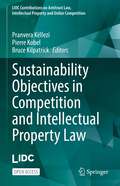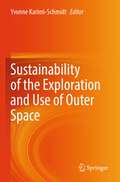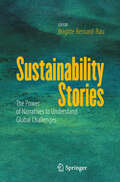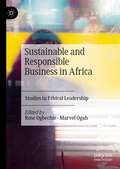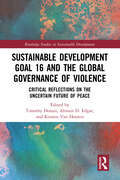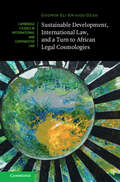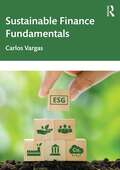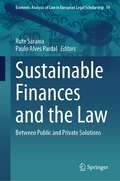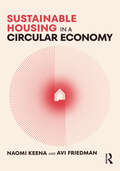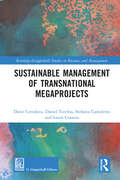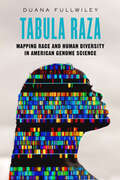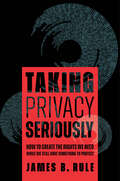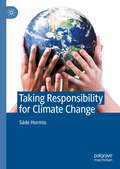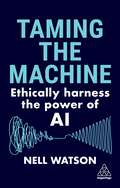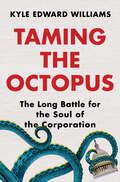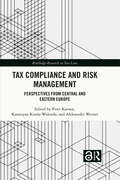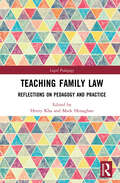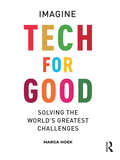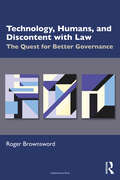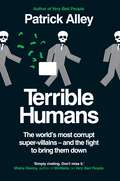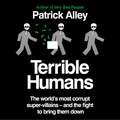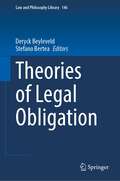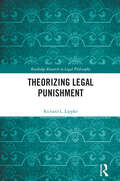- Table View
- List View
Sustainability Objectives in Competition and Intellectual Property Law (LIDC Contributions on Antitrust Law, Intellectual Property and Unfair Competition)
by Pranvera Këllezi Pierre Kobel Bruce KilpatrickThis open access volume of LIDC contributions focuses on how competition and intellectual property laws incorporate sustainability objectives. Businesses are increasingly embracing sustainability objectives, driven by the international community. Although competition and intellectual property law are certainly not the only tools for addressing sustainability issues, they can play a role in moving toward a more sustainable society.Sustainability has gained prominence in competition law in all jurisdictions covered in this volume. The contributions focus on classic questions such as whether sustainability agreements restrict competition and, if so, to what extent businesses can be exempted on efficiency grounds. The papers also raise a number of questions, in particular concerning the treatment of non-market efficiencies. The soft law and case law produced by competition authorities are examined, and the leadership role of some competition authorities in the field – from advocacy to policy papers and sustainability guidelines – is highlighted. The authors call for more individual guidance to provide enhanced transparency and clarity to industry, advisors and society at large on sustainability issues, with guidelines or sustainability-related block exemptions providing even greater legal certainty.With regard to intellectual property, the contributions examine various important issues, such as the need for intellectual property rights to remain technology-neutral, ways to promote the use of sustainable technologies and incentives for licensing, and ways to promote the dissemination of sustainable technologies, including compulsory licensing, cross-licensing, open source or FRAND licensing, and replacing the destruction of counterfeit goods with recycling. The papers also discuss greenwashing and how it can be addressed through revisions to trademarks and related rights.
Sustainability of the Exploration and Use of Outer Space
by Yvonne Karimi-SchmidtThis book provides insight into the significance of the law of outer space in promoting order, cooperation, and peaceful activities in space. It emphasizes the advantages of having a legal framework in place to govern space exploration and utilization, rather than relying on power and force.
Sustainability Stories: The Power of Narratives to Understand Global Challenges
by Brigitte Bernard-Rau"Sustainability Stories" is an impactful book that offers a global perspective on the grand theme of sustainability. Through the lens of practitioners deeply committed to this cause, the book amplifies sometimes unheard voices, inspiring readers from diverse backgrounds to embrace environmental, social, and financial responsibilities. Each contributor, whether an entrepreneur, professor, lawyer, artist, or sustainability expert, acts as a visionary communicator, forging connections and leading by example. Featuring over 30 narratives from countries such as France, Germany, India, Morocco, Spain, Switzerland, and the United States, "Sustainability Stories" is sure to engage an international audience. Through its pages, this book spreads optimism, determination, and a desire for positive societal change. It empowers readers of all ages and educational backgrounds to join the movement toward a sustainable future. By sharing unique insights and experiences, "Sustainability Stories" serves as a catalyst, inspiring individuals to take action and make a difference in their professional practices, communities and lives.
Sustainable and Responsible Business in Africa: Studies in Ethical Leadership
by Rose Ogbechie Marvel OgahThis book provides a transnational African perspective on business management concerns and business ethics by examining the concepts of responsible business practices and sustainability across sub-Saharan Africa. Covering topics ranging from ethical advertisement to responsible pricing to waste management for sustainable business, it highlights the importance of consciously and deliberately inculcating responsible practices in the creation and operation of business activities within a corporate context to achieve sustainability in African markets. The book employs a case-by-case method for treating issues in responsible business practice and sustainability, with contributions illustrating responsible and irresponsible business practices across various areas of business management. Relevant to the UN Sustainable Development Goals, it will be of great importance to academics and students of responsible business, sustainability, business ethics and African business more broadly. It will also be a helpful guide for professionals and business owners to understand some salient issues in navigating sustainable business practices in Africa.
Sustainable Development Goal 16 and the Global Governance of Violence: Critical Reflections on the Uncertain Future of Peace (Routledge Studies in Sustainable Development)
by Timothy Donais Alistair D. Edgar Kirsten Van HoutenThis book brings together a diverse range of scholars and practitioners working at the nexus of peace and development to reflect, at the mid-way point of the Sustainable Development Goals implementation period, what impact Goal 16 has made, or may yet make, toward reducing violence in ‘all its forms.’ Adopted in 2015, the Sustainable Development Goals include 17 objectives designed to shape and direct the global development agenda through to 2030, with Goal 16 aiming to promote ‘peaceful and inclusive societies for sustainable development.’ Amidst an ongoing global pandemic, evidence of a fracturing liberal international order, and the persistence of seemingly intractable conflict in large parts of the world, this volume takes stock of current progress toward providing access to justice and ensuring inclusive and democratic institutions. Across 15 chapters, the book’s contributors explore the universal aspirations of Goal 16 and its specific implications for conflict-affected states, which continue to experience ‘development in reverse,’ and for historically marginalized groups such as women, youth, the disabled, and indigenous peoples. In doing so, it offers a comprehensive assessment of Goal 16’s broader contribution to the creation of a more just, peaceful world against the realities of societies emerging from the COVID-19 pandemic and grappling with a deepening climate crisis. This volume will appeal to scholars, researchers, policymakers, and postgraduate students in sustainable development, global governance, international relations, global development, international law, and political science.
Sustainable Development, International Law, and a Turn to African Legal Cosmologies (Cambridge Studies in International and Comparative Law)
by null Godwin Eli DzahThis original book analyses and reimagines the concept of sustainable development in international law from a non-Western legal perspective. Built upon the intersection of law, politics, and history in the context of Africa, its peoples and their experiences, customary law and other legal cosmologies, this ground-breaking study applies a critical legal analysis to Africa's interaction with conceptualising and operationalising sustainable development. It proposes a turn to non-Western legal normativity as the foundational principle for reimagining sustainable development in international law. It highlights eco-legal philosophies and principles in remaking sustainable development where ecological integrity assumes a central focus in the reimagined conceptualisation and operationalisation of sustainable development. While this pioneering book highlights Africa as its analytical pivot, its arguments and proposals are useful beyond Africa. Connecting global discourses on nature, the environment, rights and development, Godwin Eli Kwadzo Dzah illuminates our current thinking on sustainable development in international law.
Sustainable Finance Fundamentals
by Carlos VargasSustainable Finance Fundamentals provides an accessible overview of this critical, rapidly growing area at the intersection of finance and sustainability. The first part showcases different approaches to sustainable finance, covering banking, impact investing, integrated reporting and strategy, and risk management. The second part covers investing, including equity, green bonds, and crowdfunding. In the final part, issues beyond sustainable finance, such as alternative investments, renewable energy, and innovation, are explored. In addition, two optional appendices provide useful introductions to the time value of money (TVM) and financial statements. Ethical and regulatory issues are addressed holistically throughout the book and sustainable finance is linked to related topics, such as environmental economics and the UN Sustainable Development Goals. Each chapter has an international focus and features examples, "in a nutshell" summaries, and discussion questions. Whether you are a student or professional, Sustainable Finance Fundamentals is essential reading for anyone looking to gain a comprehensive understanding of sustainable finance, impact investing, and related areas. Lecture slides and teaching notes are also available for instructors, making this book an ideal text for courses on sustainable finance.
Sustainable Finances and the Law: Between Public and Private Solutions (Economic Analysis of Law in European Legal Scholarship #16)
by Rute Saraiva Paulo Alves PardalSustainable (public and private) finance is closely interlinked with the Sustainable Development Goals (SDGs). The latter focus on enhancing the protection of both social and environmental assets at the local and global level, from the real economy and everyday life to financial markets and public policies, thereby laying the groundwork for a transition. Global sustainability challenges – including climate change, natural resource depletion, and rising inequality – are affecting the commercial environment and real economy in a way that presents both risks and opportunities for the private and public financial sectors. On the one hand, policymakers and investors (including banks and pensions funds) are increasingly recognizing the environment’s implications for the financial sector through both physical and transitional risks, producing impacts on financial services and products, not to mention corporate governance. On the other hand, governments and European and international institutions are aware of their sustainability-related responsibilities and the consequences of their actions. Both regulate and supervise financial markets but also use their budgetary and tax policies (e.g. carbon tax) and their participation in financial markets (e.g. green bonds and development banks) to overcome sustainability challenges. Therefore, the objective of this book is to help readers understand how private and public financial systems can be modified to create better value for society through sustainable approaches and initiatives such as the integration of environmental, social, and governance (ESG) factors in investment, procurement, and budgeting.
Sustainable Housing in a Circular Economy
by Naomi Keena Avi FriedmanThis book relates circular economy principles to housing design and construction and highlights how those principles can result in both monetary savings, positive environmental impact, and socio-ecological change.Chapters focus on three key circular economy principles and apply them to architectural construction and design, namely rethinking of the end-of-use phase of a building and the potential of design-for-disassembly; the role of digitization and data standardization in fostering evidence-based circular economy design decision-making; and presenting space as a resource to conserve, via exploration of the sharing economy and flexibility principles. Beyond waste management and material cycles, this book provides a holistic understanding of the opportunities across the building life cycle that can allow for sustainable and affordable circular housing. With case studies from 13 different countries, including but not limited to the Hammarby Sjöstad district in Sweden, the Circle House in Denmark, Benny Farm in Canada, VMD Prefabricated House in Mexico, and the Deep Performance Dwelling in China, authors pair theoretical frameworks with real-world examples.This will be a useful resource for upper-level students and academics of architecture, construction, and planning, especially those studying and researching housing design, building technology, green project management, and environmental design.
Sustainable Management of Transnational Megaprojects (Routledge-Giappichelli Studies in Business and Management)
by Dario Cottafava Daniel Torchia Stefania Camoletto Laura CorazzaThis book analyses the seminal role of megaprojects for sustainable development, and the related, complex challenges they bring. It provides insights into the growing social responsibilities that megaprojects have, not only to be environmentally sustainable, but also towards the multitude of stakeholders involved, whether directly or indirectly. After an historical overview of the increasingly necessary links between sustainable infrastructure and megaprojects, the book builds on and applies stakeholder theory to stakeholder engagement and management in megaprojects. It also emphasizes the importance of building impact assessment frameworks that consider the unheard voices that are often passively sitting at the receiving end of a megaproject, as well as the local context where the megaproject is embedded. The book then proceeds to analyse the case of a very contested transnational railway megaproject between Italy and France, the Turin-Lyon high-speed railway, which has been suffering from stakeholder and communication issues for over thirty years, as well as from notable managerial and legal differences in the two countries. In this way, the book informs both theory and practice and encourages scholarly interventions into wicked problems. It contains a comprehensive review of the academic literature on the sustainability, sustainability challenges, and sustainability reporting of megaprojects. Conceptual models, frameworks and future research opportunities are provided to clarify the empirical challenges and highlight the gaps and opportunities to be explored by researchers and practitioners in future. The audience for the book is both academic researchers and practitioners in the field of megaprojects and more specifically, those dealing with managing transnational megaprojects. It also includes several topics that will be of interest to policy and decision-makers.
Tabula Raza: Mapping Race and Human Diversity in American Genome Science (Atelier: Ethnographic Inquiry in the Twenty-First Century #14)
by Duana FullwileyDuana Fullwiley has penned an intimate chronicle of laboratory life in the genomic age. She presents many of the influential scientists at the forefront of genetics who have redefined how we practice medicine and law and understand ancestry in an era of big data and waning privacy. Exceedingly relatable and human, the scientists in these pages often struggle for visibility, teeter on the tightrope of inclusion, and work tirelessly to imprint the future. As they actively imagine a more equal and just world, they often find themselves ensnared in reproducing timeworn conceits of race and racism that can seed the same health disparities they hope to resolve. Nothing dynamic can live for long as a blank slate, an innocent tabula rasa. But how the blank slate of the once-raceless human genome became one of racial differences, in various forms of what Fullwiley calls the tabula raza, has a very specific and familiar history—one that has cycled through the ages in unexpected ways.
Taking Privacy Seriously: How to Create the Rights We Need While We Still Have Something to Protect
by James B. RuleOther books remind us of what we already know—that privacy is under great pressure. James Rule provides a step-by-step plan to create a significantly more private and authentically democratic world. Taking Privacy Seriously offers both a concise, hard-hitting assessment of the origins of today’s privacy-eroding practices and a roadmap for creating robust new individual rights over our personal data. Rule proposes eleven key reforms in the control and use of personal information, all aimed at redressing the balance of power between ordinary citizens and data-hungry corporate and government institutions. What a privacy-deprived America needs most is not less technology, Rule argues, but profound political realignment. His eleven proposed reforms range from launching a major public-works investment consisting of a series of websites publicly documenting the personal data uses of nearly all government and private institutions; to instating a right for any citizen to withdraw from any personal data system not required by law; to creating a universal property right over commercial exploitation of data on oneself—so that no company or other organization could profit from use or sale of such data without permission. Succinct and compelling, Taking Privacy Seriously explains how we can refashion information technologies so that they serve human needs, not the other way around.
Taking Responsibility for Climate Change
by Säde HormioThis book proposes that it is not only states and international bodies that have a responsibility to take action toward mitigating climate change. Other collective agents, such as corporations, need to also come onboard. Additionally, the book argues that climate change is not solely a problem for collective agents, but also for individuals, as they are members of collectives and groups of several kinds. Therefore, framing climate change responsibility exclusively from either the collective or the individual perspective leaves out something crucial: how we all are influenced by the collectives we belong to and how, in turn, collectives are influenced by individuals. The focus of the book is on areas of climate change responsibility that are often left out of the picture or get too little attention in climate ethics, such as carbon inequality within countries. But why should any theoretical arguments about normative issues matter when we have a real-life climate crisis on our hands? Säde Hormio argues that ethical arguments have an important role in setting climate policy: they can highlight what values are at stake and help ground normative arguments in public deliberations.
Taming the Machine: Ethically Harness the Power of AI
by Nell WatsonAI promises to transform our world, supercharging productivity and driving new innovations. Taming the Machine uncovers how you can responsibly harness the power of AI with confidence.AI has the potential to become a personal assistant, a creative partner, an editor and a research tool all at once. But it also represents a threat to your livelihood, data and privacy. Taming the Machine offers the practical insights and knowledge you need to work with AI with an ethical and responsible approach.In this book, celebrated AI expert and ethicist Nell Watson offers practical insights on how you can ethically innovate with AI. It delves into the ethical issues of unbridled AI, highlighting the challenges that it will bring to society and business unless we fortify cybersecurity, safeguard our data, and understand the dangerous potential of artificial intelligence.Step into the future and supercharge your performance safely by Taming the Machine.
Taming the Octopus: The Long Battle for the Soul of the Corporation
by Kyle Edward WilliamsThe untold story of how efforts to hold big business accountable changed American capitalism. Recent controversies around environmental, social, and governance (ESG) investing and “woke capital” evoke an old idea: the Progressive Era vision of a socially responsible corporation. By midcentury, the notion that big business should benefit society was a consensus view. But as Kyle Edward Williams’s brilliant history, Taming the Octopus, shows, the tools forged by New Deal liberals to hold business leaders accountable, such as the Securities and Exchange Commission, narrowly focused on the financial interests of shareholders. This inadvertently laid the groundwork for a set of fringe views to become dominant: that market forces should rule every facet of society. Along the way, American capitalism itself was reshaped, stripping businesses to their profit-making core. In this vivid and surprising history, we meet activists, investors, executives, and workers who fought over a simple question: Is the role of the corporation to deliver profits to shareholders, or something more? On one side were “business statesmen” who believed corporate largess could solve social problems. On the other were libertarian intellectuals such as Milton Friedman and his oft-forgotten contemporary, Henry Manne, whose theories justified the ruthless tactics of a growing class of corporate raiders. But Williams reveals that before the “activist investor” emerged as a capitalist archetype, Civil Rights groups used a similar playbook for different ends, buying shares to change a company from within. As a rising tide of activists pushed corporations to account for societal harms from napalm to environmental pollution to inequitable hiring, a new idea emerged: that managers could maximize value for society while still turning a maximal profit. This elusive ideal, “stakeholder capitalism,” still dominates our headlines today. Williams’s necessary history equips us to reconsider democracy’s tangled relationship with capitalism.
Tax Compliance and Risk Management: Perspectives from Central and Eastern Europe (Routledge Research in Tax Law)
by Piotr Karwat Katarzyna Kimla-Walenda Aleksander WernerThe concept of tax compliance is as old as the tax itself, but staying compliant with tax regulations has become increasingly demanding. A changing tax regulatory environment, resulting from regulatory actions of the OECD, the European Union and national governments, poses many problems for tax compliance awareness. This book explores various approaches to improving tax compliance. Starting with the procedures and processes that are at the centre of the debate, it includes the level of tax position security obtained as a result of cooperation between tax administration and an organisation, ending with tax compliance requirements imposed by one-sided action of tax administration. Offering an experience and evidence-based analysis of how tax compliance influences an organisation’s tax and financial position, the issues are examined from both a theoretical and a practical perspective, using empirical research and case studies with an international dimension for illustration. Emphasising a holistic approach to tax compliance and its role in tax risk management within an organisation, this study offers a framework for making the challenging task of tax compliance and risk management more effective and more efficient. Exploring tax compliance focusing on the tax world after the BEPS project and anti-tax evasion and anti-tax avoidance regulatory actions undertaken by the European Union and OECD, the book has a practical focus on tax system design within the organisation and will be of interest to students, researchers and practitioners working in the areas of tax law and tax compliance.
Tax Compliance and Risk Management: Perspectives from Central and Eastern Europe (Routledge Research in Tax Law)
by Piotr Karwat Katarzyna Kimla-Walenda Aleksander WernerThe concept of tax compliance is as old as the tax itself, but staying compliant with tax regulations has become increasingly demanding. A changing tax regulatory environment, resulting from regulatory actions of the OECD, the European Union and national governments, poses many problems for tax compliance awareness. This book explores various approaches to improving tax compliance. Starting with the procedures and processes that are at the centre of the debate, it includes the level of tax position security obtained as a result of cooperation between tax administration and an organisation, ending with tax compliance requirements imposed by one-sided action of tax administration. Offering an experience and evidence-based analysis of how tax compliance influences an organisation’s tax and financial position, the issues are examined from both a theoretical and a practical perspective, using empirical research and case studies with an international dimension for illustration. Emphasising a holistic approach to tax compliance and its role in tax risk management within an organisation, this study offers a framework for making the challenging task of tax compliance and risk management more effective and more efficient. Exploring tax compliance focusing on the tax world after the BEPS project and anti-tax evasion and anti-tax avoidance regulatory actions undertaken by the European Union and OECD, the book has a practical focus on tax system design within the organisation and will be of interest to students, researchers and practitioners working in the areas of tax law and tax compliance.
Teaching Family Law: Reflections on Pedagogy and Practice (Legal Pedagogy)
by Henry Kha and Mark HenaghanThis book provides a comprehensive analysis of the teaching of an eclectic range of family law topics and the unique opportunities and challenges of teaching family law in different jurisdictions from a varied international perspective. Written by leading legal scholars, the book addresses a gap in the scholarship to comprehensively and systematically analyse the teaching of family law. The first part of the book explores ways of teaching the varied range of topics under the heading of family law and captures the diverse approaches to the discipline. Chapters illustrate how the subject can be best taught in an interdisciplinary way that considers feminist perspectives and the philosophy of teaching, while encompassing legal positivism, empirical research and critical legal theory. The second part of the book examines teaching in different jurisdictions and illustrates policy and practice in Australia, New Zealand, the United States, Canada, the United Kingdom, Hong Kong and South Africa. Showcasing examples of best practice of teaching family law, the book will be an essential reading for legal scholars, as well as researchers and postgraduate students in the fields of family law and legal education.
Tech For Good: Imagine Solving the World’s Greatest Challenges
by Marga HoekTech For Good reveals how Fourth Industrial Revolution technologies will help solve the world’s greatest challenges like climate change, biodiversity loss, inequality, and poverty. Tech For Good presents a unique perspective on how business can successfully apply advanced technologies in a purpose-driven manner while unlocking new markets and seizing business opportunities. Packed with 75 real-life business cases of companies from all over the world, this inspiring book unfolds a compelling narrative about how businesses commercially synergize technology and sustainability. The purpose of this book is to imagine the unprecedented possibilities advanced technologies offer business to drive sustainable growth. Tech for Good will be vital for realizing our Global Goals.
Technology, Humans, and Discontent with Law: The Quest for Better Governance
by Roger BrownswordThis book analyses discontent with law and assesses the prospect of better governance by technology. In the first part of the book, where the context is ‘low tech’, the range of discontent with law is examined; the underlying reasons for such discontent are identified (namely, the human nature of the legal enterprise, its reliance on rules, and the pluralistic nature of human communities); and the reasonableness of such discontent is assessed. In the second part of the book, where the context is ‘high-tech’ (with new tools becoming available to undertake governance functions), the question is whether discontent with law is further provoked or, to the contrary, is eased. While new technologies provoke further discontent with law’s claimed authority, its ineffectiveness, and its principles, positions, and policies, they also promise more effective and efficient ways of achieving order. The book closes with some reflections on the ambivalence that humans might experience when faced with the choice between law’s governance and apparently better performing governance by technology. That law’s governance is imperfect is undeniable; that humans should quest after better governance is right; but, the shape of our technological futures is unclear. This accessibly written book will appeal to scholars and students who are working in the broad and burgeoning field of law, regulation, and technology, as well as to legal theorists, political scientists, and sociologists with interests in the impact of new technology.
Terrible Humans: The World's Most Corrupt Super-Villains And The Fight to Bring Them Down
by Patrick Alley'Few people have shown more commitment to investigative journalism than Patrick Alley. His latest book is a vivid, compelling testament to the importance of revealing corruption and wrong-doing and shining a light into dark places, wherever in the world they are.' -Peter Geoghegan, author of Democracy for SaleA small number of people, motivated by an insatiable greed for power and wealth, and backed by a pinstripe army of enablers (and sometimes real armies too), have driven the world to the brink of destruction. They are the super-villains of corruption and war, some with a power greater than nation state and the capacity to derail the world order. Propping up their opulent lifestyles is a mess of crime, violence and deception on a monumental scale. But there is a fightback: small but fearless groups of brilliant undercover sleuths closing in on them, one step at a time.In Terrible Humans, Patrick Alley, co-founder of Global Witness and the author of Very Bad People, introduces us to some of the world's worst warlords, grifters and kleptocrats who can be found everywhere from presidential palaces to the board rooms of some of the world's best known companies. Pitted against them, the book also follows the people unravelling the deals, tracking the money and going undercover at great risk. From the oligarch charged with ordering the killing of an investigative journalist to the mercenary army seizing the natural resources of an entire African country, this is a whirlwind tour of the dark underbelly of the world's super powerful and wickedly wealthy, and the daring investigators dragging them into the light.***PRAISE FOR Very Bad People:'Reads like a John le Carré novel but is, in fact, very real.' -The Big Issue'Part true crime tale, part investigative procedural, this is the account of the brilliant and necessary superheroes of Global Witness, whose superpower is the truth.' -Edward Zwick, Director of Blood Diamond'Very Bad People reads like a non-stop high-speed chase' -David Farr, Screenwriter, The Night Manager'Simply riveting. Don't miss it.' -Misha Glenny, author of McMafia'A clear-eyed account of a world poisoned by dark money, and a welcome reminder that resistance is possible.' -Irish Times
Terrible Humans: The World's Most Corrupt Super-Villains And The Fight to Bring Them Down
by Patrick Alley'Few people have shown more commitment to investigative journalism than Patrick Alley. His latest book is a vivid, compelling testament to the importance of revealing corruption and wrong-doing and shining a light into dark places, wherever in the world they are.' -Peter Geoghegan, author of Democracy for SaleA small number of people, motivated by an insatiable greed for power and wealth, and backed by a pinstripe army of enablers (and sometimes real armies too), have driven the world to the brink of destruction. They are the super-villains of corruption and war, some with a power greater than nation state and the capacity to derail the world order. Propping up their opulent lifestyles is a mess of crime, violence and deception on a monumental scale. But there is a fightback: small but fearless groups of brilliant undercover sleuths closing in on them, one step at a time.In Terrible Humans, Patrick Alley, co-founder of Global Witness and the author of Very Bad People, introduces us to some of the world's worst warlords, grifters and kleptocrats who can be found everywhere from presidential palaces to the board rooms of some of the world's best known companies. Pitted against them, the book also follows the people unravelling the deals, tracking the money and going undercover at great risk. From the oligarch charged with ordering the killing of an investigative journalist to the mercenary army seizing the natural resources of an entire African country, this is a whirlwind tour of the dark underbelly of the world's super powerful and wickedly wealthy, and the daring investigators dragging them into the light.***PRAISE FOR Very Bad People:'Reads like a John le Carré novel but is, in fact, very real.' -The Big Issue'Part true crime tale, part investigative procedural, this is the account of the brilliant and necessary superheroes of Global Witness, whose superpower is the truth.' -Edward Zwick, Director of Blood Diamond'Very Bad People reads like a non-stop high-speed chase' -David Farr, Screenwriter, The Night Manager'Simply riveting. Don't miss it.' -Misha Glenny, author of McMafia'A clear-eyed account of a world poisoned by dark money, and a welcome reminder that resistance is possible.' -Irish Times
Terrible Humans: The World's Most Corrupt Super-Villains And The Fight to Bring Them Down
by Patrick Alley'Few people have shown more commitment to investigative journalism than Patrick Alley. His latest book is a vivid, compelling testament to the importance of revealing corruption and wrong-doing and shining a light into dark places, wherever in the world they are.' -Peter Geoghegan, author of Democracy for SaleA small number of people, motivated by an insatiable greed for power and wealth, and backed by a pinstripe army of enablers (and sometimes real armies too), have driven the world to the brink of destruction. They are the super-villains of corruption and war, some with a power greater than nation state and the capacity to derail the world order. Propping up their opulent lifestyles is a mess of crime, violence and deception on a monumental scale. But there is a fightback: small but fearless groups of brilliant undercover sleuths closing in on them, one step at a time.In Terrible Humans, Patrick Alley, co-founder of Global Witness and the author of Very Bad People, introduces us to some of the world's worst warlords, grifters and kleptocrats who can be found everywhere from presidential palaces to the board rooms of some of the world's best known companies. Pitted against them, the book also follows the people unravelling the deals, tracking the money and going undercover at great risk. From the oligarch charged with ordering the killing of an investigative journalist to the mercenary army seizing the natural resources of an entire African country, this is a whirlwind tour of the dark underbelly of the world's super powerful and wickedly wealthy, and the daring investigators dragging them into the light.***PRAISE FOR Very Bad People:'Reads like a John le Carré novel but is, in fact, very real.' -The Big Issue'Part true crime tale, part investigative procedural, this is the account of the brilliant and necessary superheroes of Global Witness, whose superpower is the truth.' -Edward Zwick, Director of Blood Diamond'Very Bad People reads like a non-stop high-speed chase' -David Farr, Screenwriter, The Night Manager'Simply riveting. Don't miss it.' -Misha Glenny, author of McMafia'A clear-eyed account of a world poisoned by dark money, and a welcome reminder that resistance is possible.' -Irish Times
Theories of Legal Obligation (Law and Philosophy Library #146)
by Deryck Beyleveld Stefano BerteaThis volume collects six original essays by internationally respected researchers who have devoted themselves to the study of legal obligation. It brings together works that innovatively address key dimensions of the current debates concerning legal obligation from different and, in some cases, even opposing theoretical perspectives. As a result, the collection offers a comprehensive discussion of legal obligation that promises to significantly advance our understanding of the obligatory dimension of law. What specifically connects the contributions gathered here is one common thread: coming to terms with a notion – legal obligation – that is of both practical and theoretical importance. On the one hand, it is widely regarded as a fundamental legal concept by legal practitioners and laypeople alike, as not only judges, prosecutors, lawyers, and juries but also ordinary citizens make extensive use of obligation-related terms and discourses. On the other hand, the notion of legal obligation is of paramount significance for the theory of law. Indeed, even legal theorists who, quite understandably, refuse to reduce the law to a mere obligation-imposing device and opt instead for a view in which the normative dimension of the law also encompasses powers, rights, permissions, privileges and immunities, duly acknowledge the centrality of legal obligation for the understanding and conceptualisation of law. Hence the importance of the treatments presented in this volume.
Theorizing Legal Punishment (Routledge Research in Legal Philosophy)
by Richard L. LippkeThis book systematically defends an account of the institution of legal punishment that draws on both retributive and crime-prevention thinking. The work argues that legal punishment censures convicted offenders and thus morally communicates with them, any victims, and the broader community, while also serving to reduce future crime. The expressive or retributive element is assigned the lead role in this mixed account because it better captures the notion that members of society are to be held morally accountable for their failures to abide by defensible criminal prohibitions of various kinds. Despite this, it is conceded that the reduction of crime plays a vital role in justifying the institution of legal punishment and the book contains extended discussion of how and why this is so. Beyond its explication of the aims of legal punishment and their respective roles within a mixed theory, the study devotes separate chapters to sentencing, criminal procedure, and the imposition of fees and collateral legal consequences on individuals who have been convicted of crimes and fully served their sentences. In these ways, the work moves beyond discussion of the abstract aims of legal punishment to details of the institution’s internal structure and operations. The many historical deficiencies and failures of the institution are duly noted and the challenges they pose for punishment theorizing are examined. The book closes with discussion of the limited success of punishment institutions in apprehending, convicting, and punishing those who violate the law, including many who do so in serious ways. Alternatives to reliance on legal punishment institutions are briefly examined. In the end, retention of such institutions is urged although it is suggested that we ought to have modest expectations about their ultimate success. The work will be of interest to those working in the areas of Legal Philosophy and Criminology.
